【期末备考】人教新目标版七下英语期末基础知识梳理(Unit 7—Unit 12)(标注重难点)
文档属性
| 名称 | 【期末备考】人教新目标版七下英语期末基础知识梳理(Unit 7—Unit 12)(标注重难点) | 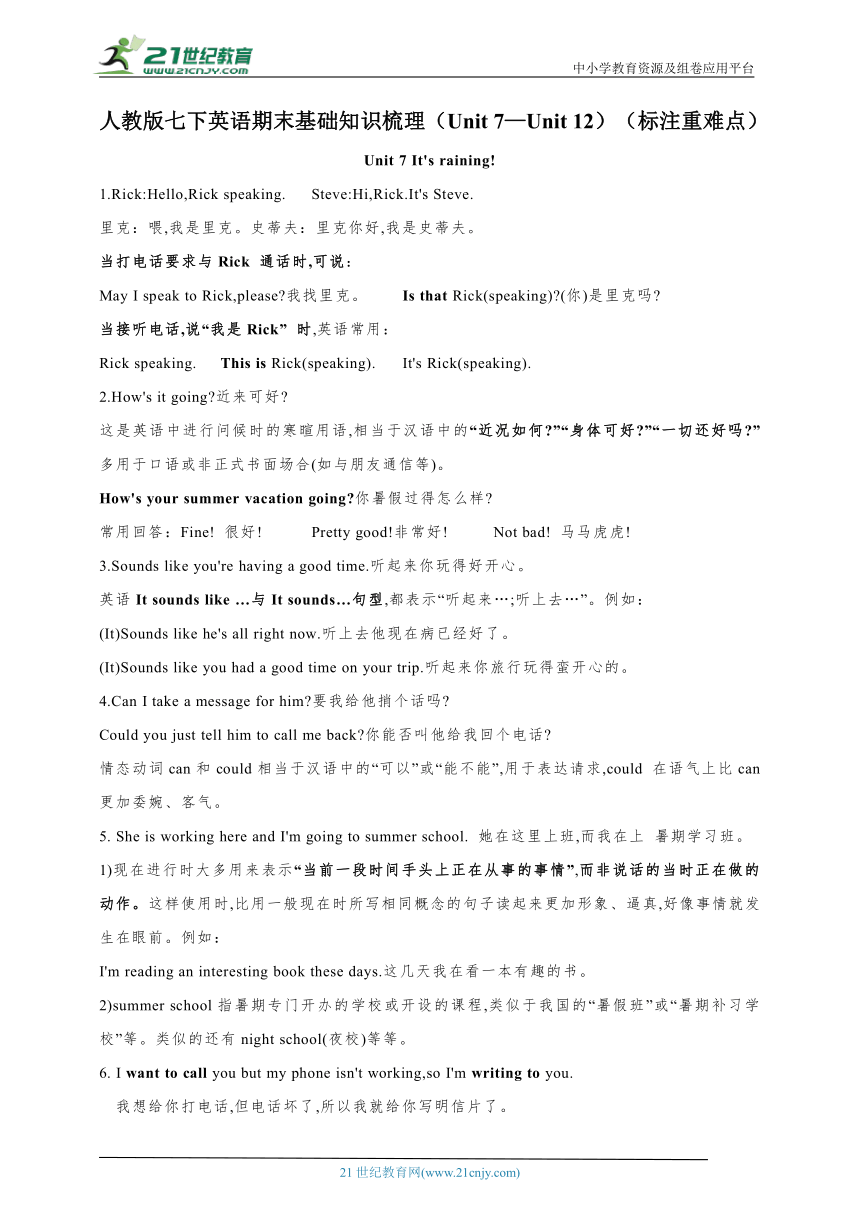 | |
| 格式 | docx | ||
| 文件大小 | 300.6KB | ||
| 资源类型 | 试卷 | ||
| 版本资源 | 人教新目标(Go for it)版 | ||
| 科目 | 英语 | ||
| 更新时间 | 2024-06-02 21:41:29 | ||
图片预览

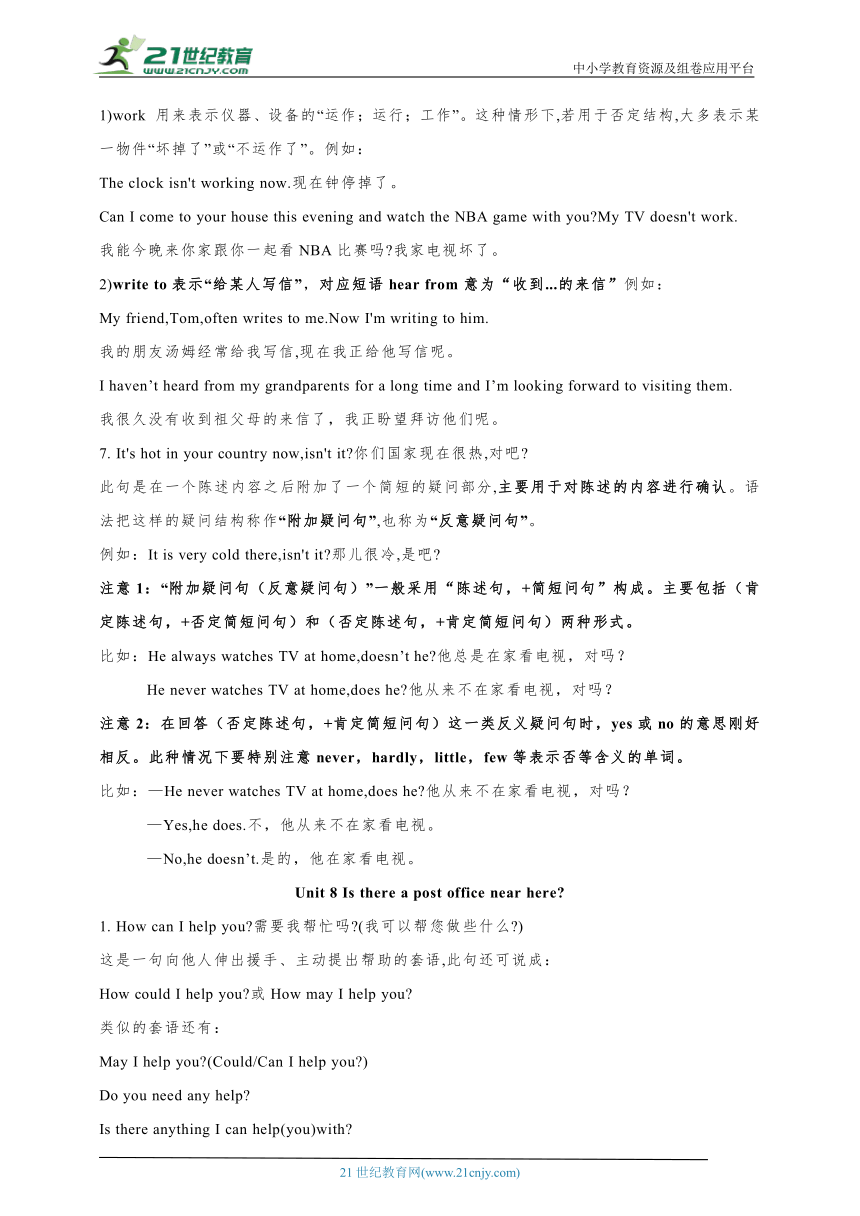
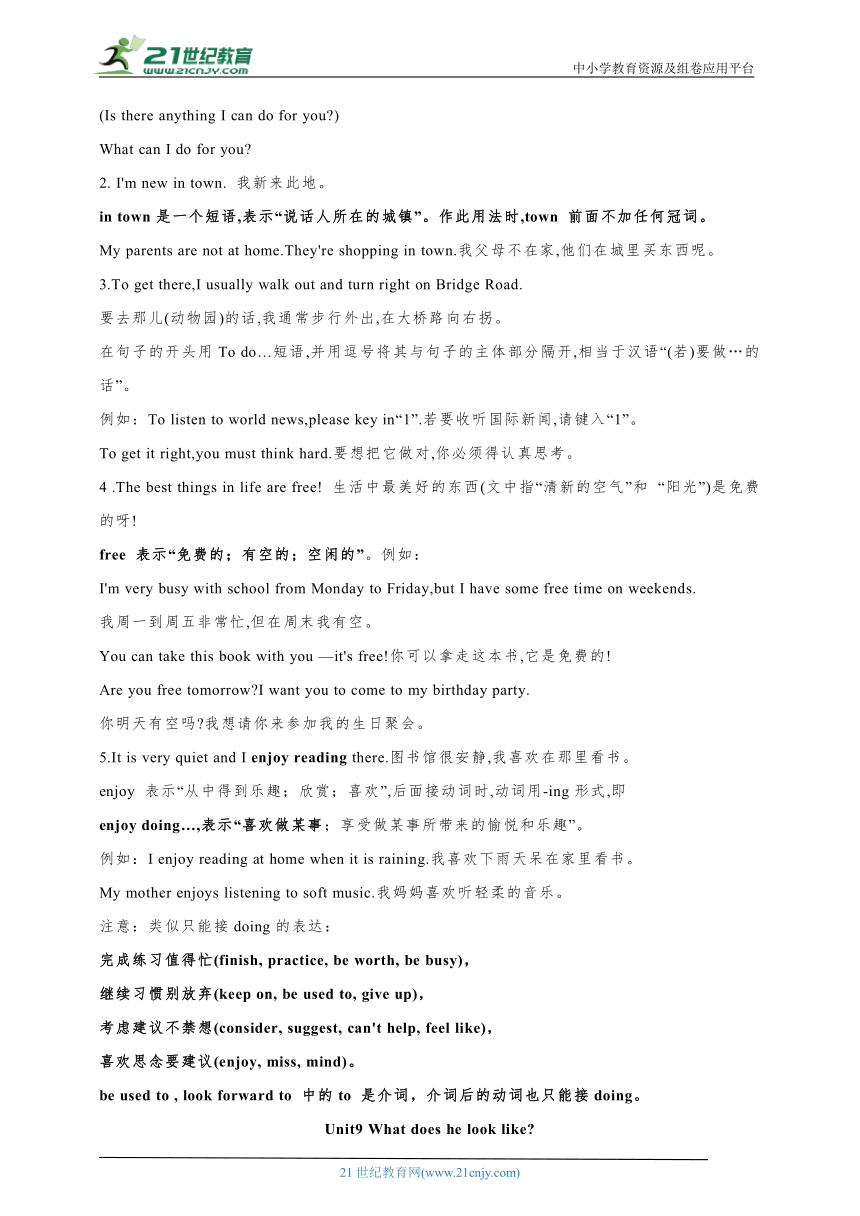
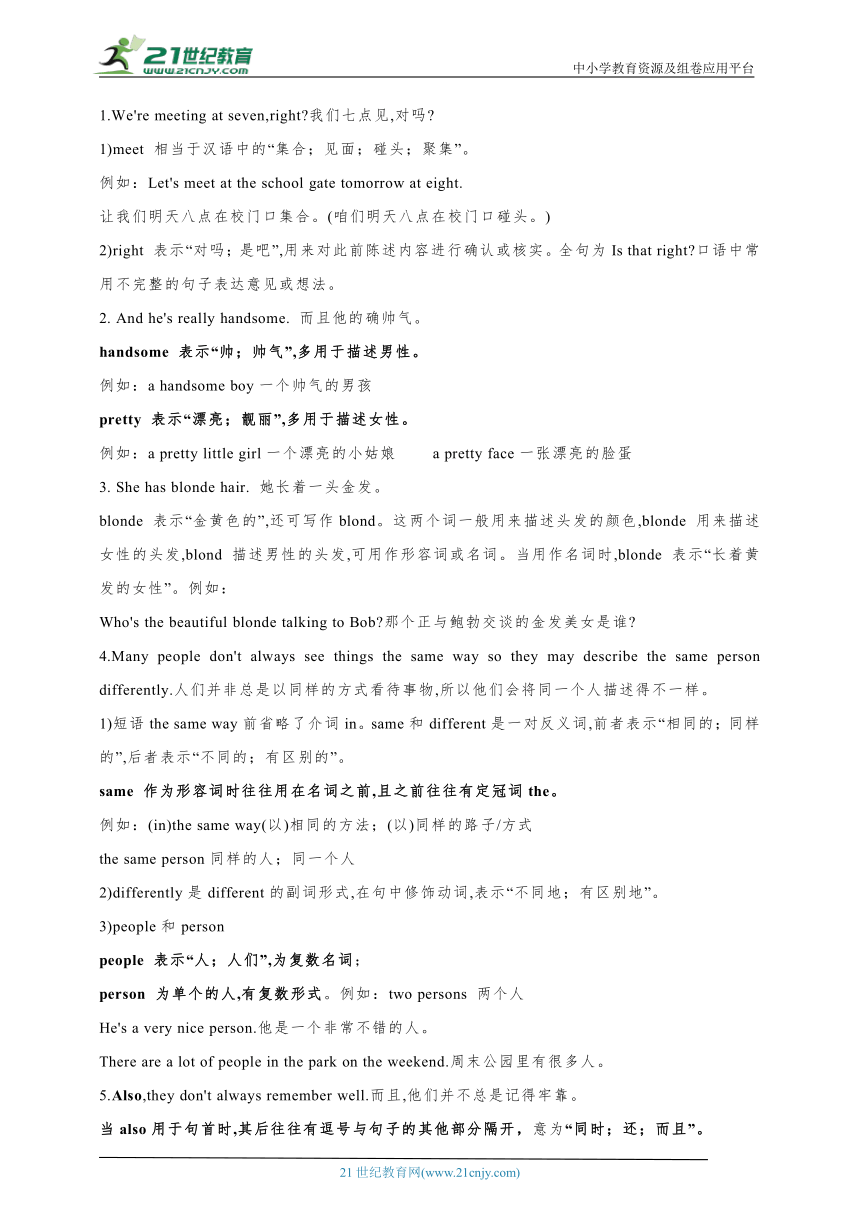
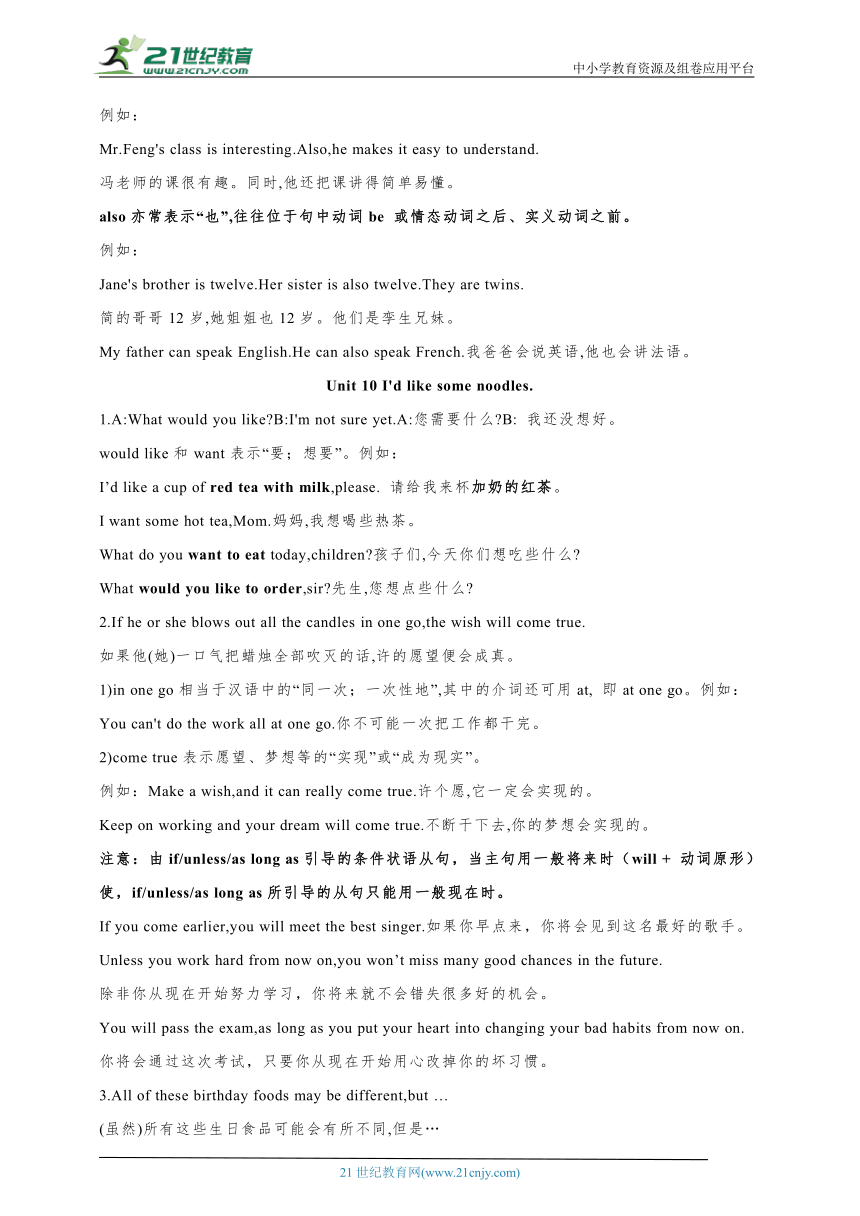
文档简介
中小学教育资源及组卷应用平台
人教版七下英语期末基础知识梳理(Unit 7—Unit 12)(标注重难点)
Unit 7 It's raining!
1.Rick:Hello,Rick speaking. Steve:Hi,Rick.It's Steve.
里克:喂,我是里克。史蒂夫:里克你好,我是史蒂夫。
当打电话要求与Rick 通话时,可说:
May I speak to Rick,please 我找里克。 Is that Rick(speaking) (你)是里克吗
当接听电话,说“我是Rick” 时,英语常用:
Rick speaking. This is Rick(speaking). It's Rick(speaking).
2.How's it going 近来可好
这是英语中进行问候时的寒暄用语,相当于汉语中的“近况如何 ”“身体可好 ”“一切还好吗 ”多用于口语或非正式书面场合(如与朋友通信等)。
How's your summer vacation going 你暑假过得怎么样
常用回答:Fine! 很好! Pretty good!非常好! Not bad! 马马虎虎!
3.Sounds like you're having a good time.听起来你玩得好开心。
英语It sounds like …与It sounds…句型,都表示“听起来…;听上去…”。例如:
(It)Sounds like he's all right now.听上去他现在病已经好了。
(It)Sounds like you had a good time on your trip.听起来你旅行玩得蛮开心的。
4.Can I take a message for him 要我给他捎个话吗
Could you just tell him to call me back 你能否叫他给我回个电话
情态动词can和could相当于汉语中的“可以”或“能不能”,用于表达请求,could 在语气上比can 更加委婉、客气。
5. She is working here and I'm going to summer school. 她在这里上班,而我在上 暑期学习班。
1)现在进行时大多用来表示“当前一段时间手头上正在从事的事情”,而非说话的当时正在做的动作。这样使用时,比用一般现在时所写相同概念的句子读起来更加形象、逼真,好像事情就发生在眼前。例如:
I'm reading an interesting book these days.这几天我在看一本有趣的书。
2)summer school指暑期专门开办的学校或开设的课程,类似于我国的“暑假班”或“暑期补习学校”等。类似的还有night school(夜校)等等。
6. I want to call you but my phone isn't working,so I'm writing to you.
我想给你打电话,但电话坏了,所以我就给你写明信片了。
1)work 用来表示仪器、设备的“运作;运行;工作”。这种情形下,若用于否定结构,大多表示某一物件“坏掉了”或“不运作了”。例如:
The clock isn't working now.现在钟停掉了。
Can I come to your house this evening and watch the NBA game with you My TV doesn't work.
我能今晚来你家跟你一起看NBA比赛吗 我家电视坏了。
2)write to表示“给某人写信”,对应短语hear from意为“收到...的来信”例如:
My friend,Tom,often writes to me.Now I'm writing to him.
我的朋友汤姆经常给我写信,现在我正给他写信呢。
I haven’t heard from my grandparents for a long time and I’m looking forward to visiting them.
我很久没有收到祖父母的来信了,我正盼望拜访他们呢。
7. It's hot in your country now,isn't it 你们国家现在很热,对吧
此句是在一个陈述内容之后附加了一个简短的疑问部分,主要用于对陈述的内容进行确认。语法把这样的疑问结构称作“附加疑问句”,也称为“反意疑问句”。
例如:It is very cold there,isn't it 那儿很冷,是吧
注意1:“附加疑问句(反意疑问句)”一般采用“陈述句,+简短问句”构成。主要包括(肯定陈述句,+否定简短问句)和(否定陈述句,+肯定简短问句)两种形式。
比如:He always watches TV at home,doesn’t he 他总是在家看电视,对吗?
He never watches TV at home,does he 他从来不在家看电视,对吗?
注意2:在回答(否定陈述句,+肯定简短问句)这一类反义疑问句时,yes或no的意思刚好相反。此种情况下要特别注意never,hardly,little,few等表示否等含义的单词。
比如:—He never watches TV at home,does he 他从来不在家看电视,对吗?
—Yes,he does.不,他从来不在家看电视。
—No,he doesn’t.是的,他在家看电视。
Unit 8 Is there a post office near here
1. How can I help you 需要我帮忙吗 (我可以帮您做些什么 )
这是一句向他人伸出援手、主动提出帮助的套语,此句还可说成:
How could I help you 或How may I help you
类似的套语还有:
May I help you (Could/Can I help you )
Do you need any help
Is there anything I can help(you)with
(Is there anything I can do for you )
What can I do for you
2. I'm new in town. 我新来此地。
in town是一个短语,表示“说话人所在的城镇”。作此用法时,town 前面不加任何冠词。
My parents are not at home.They're shopping in town.我父母不在家,他们在城里买东西呢。
3.To get there,I usually walk out and turn right on Bridge Road.
要去那儿(动物园)的话,我通常步行外出,在大桥路向右拐。
在句子的开头用To do…短语,并用逗号将其与句子的主体部分隔开,相当于汉语“(若)要做…的话”。
例如:To listen to world news,please key in“1”.若要收听国际新闻,请键入“1”。
To get it right,you must think hard.要想把它做对,你必须得认真思考。
4 .The best things in life are free! 生活中最美好的东西(文中指“清新的空气”和 “阳光”)是免费的呀!
free 表示“免费的;有空的;空闲的”。例如:
I'm very busy with school from Monday to Friday,but I have some free time on weekends.
我周一到周五非常忙,但在周末我有空。
You can take this book with you —it's free!你可以拿走这本书,它是免费的!
Are you free tomorrow I want you to come to my birthday party.
你明天有空吗 我想请你来参加我的生日聚会。
5.It is very quiet and I enjoy reading there.图书馆很安静,我喜欢在那里看书。
enjoy 表示“从中得到乐趣;欣赏;喜欢”,后面接动词时,动词用-ing形式,即
enjoy doing…,表示“喜欢做某事;享受做某事所带来的愉悦和乐趣”。
例如:I enjoy reading at home when it is raining.我喜欢下雨天呆在家里看书。
My mother enjoys listening to soft music.我妈妈喜欢听轻柔的音乐。
注意:类似只能接doing的表达:
完成练习值得忙(finish, practice, be worth, be busy),
继续习惯别放弃(keep on, be used to, give up),
考虑建议不禁想(consider, suggest, can't help, feel like),
喜欢思念要建议(enjoy, miss, mind)。
be used to , look forward to 中的to 是介词,介词后的动词也只能接doing。
Unit9 What does he look like
1.We're meeting at seven,right 我们七点见,对吗
1)meet 相当于汉语中的“集合;见面;碰头;聚集”。
例如:Let's meet at the school gate tomorrow at eight.
让我们明天八点在校门口集合。(咱们明天八点在校门口碰头。)
2)right 表示“对吗;是吧”,用来对此前陈述内容进行确认或核实。全句为Is that right 口语中常用不完整的句子表达意见或想法。
2. And he's really handsome. 而且他的确帅气。
handsome 表示“帅;帅气”,多用于描述男性。
例如:a handsome boy一个帅气的男孩
pretty 表示“漂亮;靓丽”,多用于描述女性。
例如:a pretty little girl一个漂亮的小姑娘 a pretty face一张漂亮的脸蛋
3. She has blonde hair. 她长着一头金发。
blonde 表示“金黄色的”,还可写作blond。这两个词一般用来描述头发的颜色,blonde 用来描述女性的头发,blond 描述男性的头发,可用作形容词或名词。当用作名词时,blonde 表示“长着黄发的女性”。例如:
Who's the beautiful blonde talking to Bob 那个正与鲍勃交谈的金发美女是谁
4.Many people don't always see things the same way so they may describe the same person differently.人们并非总是以同样的方式看待事物,所以他们会将同一个人描述得不一样。
1)短语the same way前省略了介词in。same和different是一对反义词,前者表示“相同的;同样的”,后者表示“不同的;有区别的”。
same 作为形容词时往往用在名词之前,且之前往往有定冠词the。
例如:(in)the same way(以)相同的方法;(以)同样的路子/方式
the same person同样的人;同一个人
2)differently是different的副词形式,在句中修饰动词,表示“不同地;有区别地”。
3)people和person
people 表示“人;人们”,为复数名词;
person 为单个的人,有复数形式。例如:two persons 两个人
He's a very nice person.他是一个非常不错的人。
There are a lot of people in the park on the weekend.周末公园里有很多人。
5.Also,they don't always remember well.而且,他们并不总是记得牢靠。
当also用于句首时,其后往往有逗号与句子的其他部分隔开,意为“同时;还;而且”。
例如:
Mr.Feng's class is interesting.Also,he makes it easy to understand.
冯老师的课很有趣。同时,他还把课讲得简单易懂。
also亦常表示“也”,往往位于句中动词be 或情态动词之后、实义动词之前。
例如:
Jane's brother is twelve.Her sister is also twelve.They are twins.
简的哥哥12岁,她姐姐也12岁。他们是孪生兄妹。
My father can speak English.He can also speak French.我爸爸会说英语,他也会讲法语。
Unit 10 I'd like some noodles.
1.A:What would you like B:I'm not sure yet.A:您需要什么 B: 我还没想好。
would like和want表示“要;想要”。例如:
I’d like a cup of red tea with milk,please. 请给我来杯加奶的红茶。
I want some hot tea,Mom.妈妈,我想喝些热茶。
What do you want to eat today,children 孩子们,今天你们想吃些什么
What would you like to order,sir 先生,您想点些什么
2.If he or she blows out all the candles in one go,the wish will come true.
如果他(她)一口气把蜡烛全部吹灭的话,许的愿望便会成真。
1)in one go相当于汉语中的“同一次;一次性地”,其中的介词还可用at, 即at one go。例如:
You can't do the work all at one go.你不可能一次把工作都干完。
2)come true表示愿望、梦想等的“实现”或“成为现实”。
例如:Make a wish,and it can really come true.许个愿,它一定会实现的。
Keep on working and your dream will come true.不断干下去,你的梦想会实现的。
注意:由if/unless/as long as引导的条件状语从句,当主句用一般将来时(will + 动词原形)使,if/unless/as long as所引导的从句只能用一般现在时。
If you come earlier,you will meet the best singer.如果你早点来,你将会见到这名最好的歌手。
Unless you work hard from now on,you won’t miss many good chances in the future.
除非你从现在开始努力学习,你将来就不会错失很多好的机会。
You will pass the exam,as long as you put your heart into changing your bad habits from now on.
你将会通过这次考试,只要你从现在开始用心改掉你的坏习惯。
3.All of these birthday foods may be different,but …
(虽然)所有这些生日食品可能会有所不同,但是…
1)food 表示“食物”时,一般为不可数名词。例如:baby food婴儿食品;cat food猫粮
当food 用作可数名词时,表示“某类食品”。此处birthday foods表示“各种各样的生日食品”。例如:
Doctors always say eating fatty foods is an unhealthy habit.
大夫们总是会说吃各种油腻食品是一个不健康的习惯。
2)情态动词may 表示“可能;也许”。例如:
He may come,or he may not.他或许来,或许不来。
I may be late,so don't wait for me.我可能会迟到,所以别等我。
注意:在英语中,though或although不能和but同时出现在一个表示“虽然...,但是...”的语句中。类似的还有because和so。
Although he is very old,but he is very healthy.(×)
Although he is very old,he is very healthy.(√)
He is very old,but he is very healthy.(√)
Unit 11 How was your school trip
1. Did Carol take any photos 卡萝尔拍照片了吗
take a photo/picture of表示“拍摄某物或人”。例如:
Where's your camera Let me take a picture of that house.It's so beautiful.
你的相机在哪儿 让我给那栋房子照张像,它太漂亮了。
That girl likes to take photos of herself with her cell phone.那个女孩喜欢用手机自拍。
2. It was so much fun. 那真是蛮好玩的(文中指钓鱼、喂鸡挺有意思的)。
fun表示“有趣的事情”,为不可数名词。例如:
Look,Peter.The children are having so much fun.彼得,你瞧,孩子们玩得多么开心。
3. Lucky you! 你真幸运!
这是一句非正式口语,相当于You're so lucky.
Lucky 之后的人称还可改为me,him 等。例如:
A:There was no power at school last night.It was so dark. 昨天晚上学校停电了,漆黑一片。
B:Lucky me.I was not there.我多幸运呀,不在那里。
4.All in all,it was an exciting day. 总之,这是令人兴奋的一天。
All in all相当于汉语中的“总的说来;总之;整体上说”,用来对所阐述的内容进行概括性总结及归纳。
例如:All in all,I think you did a good job. 总的说来,我认为你干得很好。
5.I didn't like the trip at all.我一点都不喜欢这次行程。
not at all/not.…at all相当于“根本不;完全不”。
例如:I don't like mutton at all.我一点都不喜欢(吃)羊肉。
She's not at all good at badminton.她完全不擅长打羽毛球。
Unit 12 What did you do last weekend
1.How interesting!多么有趣啊!
感叹句结构是“How+形容词或副词+感叹号(!)”,表示“多么…!”。
例如:Look at that bird.How beautiful! 瞧那只鸟,多么漂亮呀!
Some five hours ago we left Beijing on this train,but now we're arriving in Shanghai!How fast!
差不多5个小时前我们才乘火车离开北京,可现在我们就要到上海了!多快啊!
注意:英语中只有How和What两个感叹词,其中How主要用来引导形容词或者副词,而What主要用来引导名词短语,即:
感叹词 结构 例句
How How+adj./adv.+主语+谓语! How hard people are working! 人们工作多努力啊!
How+主语+谓语! How time flies! 时间过得真快啊! How she wishes to go abroad! 她多想出国啊!
What What+a/an+adj.+可数名词单数+(主谓)! What an interesting book (it is)! (它是)多有趣的一本书啊!
What+adj.+可数名词复数/不可数名词+(主谓)! What beautiful flowers (they are)! (它们是) 多漂亮的花啊! What exciting news (it is)! (它是)多令人振奋的消息啊!
2. Father Mouse shouted at the cat,“Woof,woof!” 老鼠爸爸冲着猫大声吼叫:“汪汪,汪汪!”
We shouted to our parents to let them know about the danger. 我们对父母大声叫喊,想让他们知道我们的危险。
shout at sb.与shout to sb.的区别。
shout at sb. 多指因生气或愤怒“冲某人大声吼叫,嚷嚷” Could you stop shouting at the children 别对孩子们嚷嚷了,好吗
shout to sb. “对某人大声叫喊”,目的是让别人听见。 There was so much noise that I had to shout to her. 太吵了,我不得不冲她大声叫喊。
3.Well,son,that's why it's important to learn a second language.
所以嘛,儿子,这就是为什么多学一门语言重要啦。
….it was important not to go near a snake.…重要的是不要靠近蛇。
It is+形容词+to do sth. “做某事是...的”。
例如:It's easy to run,but it's not so easy to be the first.
跑是很容易的,但要当第一名却不 那么容易。
It's difficult for me to study math.对我来说,学习数学好难啊。
4.As a special gift,our parents took us to India.作为一份特殊的礼物,我爸妈带着 我们去了印度。
1)此处介词as 表示“作为…;当作…”,其后可以接职业、用途、特点等。用在句首时,这种短语的后面往往有逗号与语句的主体隔开。例如:
As a student,I must work hard.作为一名学生,我必须努力学习。
2)本句中动词take 表示“带领”,take…to…则表示“带领某人去某处”。例如:
On Sundays,the father would take his son to the park.一到星期天,爸爸便会带他的儿子去公园。
5. There we put up tents and made a fire to keep us warm and cook food on. 在那里我们架起帐篷,生火取暖并做饭。
1)请注意本句中的这些相对固定的动宾短语表达法:put up tents搭建帐篷;make a fire生火;点起篝火;keep us warm使得我们暖和;cook food on the fire在火上做饭
2)本句的to keep us warm and cook food on(it)表达的是made afire的目的。
6.On the first night,…在头一天夜里,…
一般来讲,英语中表示一天中的时间分别采用at night(在夜里)、in the morning (在早上或上午)、in the evening(在晚上)等,但表示“在某一天上午、下午或晚上” 等的特定时间,往往使用介词on。例如:
On the early morning of November 20th,we got a special postcard.
在11月20号一大清早,我们收到了一张特殊的明信片。
7.But I was so tired that I went to sleep early. 但是我太累了,所以早早就睡着了。
I was so scared that I couldn't move.我是那么害怕,一动都不敢动。
英语中 “so+形容词+that句子”,表示“太…以至于…”。
例如:The game is so interesting that I don't want to stop playing it.
这个游戏是如此有意思,以至于我都不想停下来。
The soup was so delicious that he drank it up.汤是那么好喝,于是他喝了个精光。
8. …we saw a big snake sleeping near the fire. 我们看见一条大蛇正在篝火附近睡觉。
My dad told me later that snakes .…can feel things moving.
后来我爸告诉我 蛇…能够感到东西的移动。
英语中表示感官的动词,例如see,hear,feel 等动词后可以接动词-ing 形式,表示 “看见、听到、觉得某人或物在做(某事)”。例如:
I can hear the children singing in the classroom.我能听见孩子们在教室里唱歌。
I looked out of the window and saw some boys playing soccer in the playground. 我往窗外望去,看见一些男孩子在操场踢球。
21世纪教育网 www.21cnjy.com 精品试卷·第 2 页 (共 2 页)
21世纪教育网(www.21cnjy.com)
人教版七下英语期末基础知识梳理(Unit 7—Unit 12)(标注重难点)
Unit 7 It's raining!
1.Rick:Hello,Rick speaking. Steve:Hi,Rick.It's Steve.
里克:喂,我是里克。史蒂夫:里克你好,我是史蒂夫。
当打电话要求与Rick 通话时,可说:
May I speak to Rick,please 我找里克。 Is that Rick(speaking) (你)是里克吗
当接听电话,说“我是Rick” 时,英语常用:
Rick speaking. This is Rick(speaking). It's Rick(speaking).
2.How's it going 近来可好
这是英语中进行问候时的寒暄用语,相当于汉语中的“近况如何 ”“身体可好 ”“一切还好吗 ”多用于口语或非正式书面场合(如与朋友通信等)。
How's your summer vacation going 你暑假过得怎么样
常用回答:Fine! 很好! Pretty good!非常好! Not bad! 马马虎虎!
3.Sounds like you're having a good time.听起来你玩得好开心。
英语It sounds like …与It sounds…句型,都表示“听起来…;听上去…”。例如:
(It)Sounds like he's all right now.听上去他现在病已经好了。
(It)Sounds like you had a good time on your trip.听起来你旅行玩得蛮开心的。
4.Can I take a message for him 要我给他捎个话吗
Could you just tell him to call me back 你能否叫他给我回个电话
情态动词can和could相当于汉语中的“可以”或“能不能”,用于表达请求,could 在语气上比can 更加委婉、客气。
5. She is working here and I'm going to summer school. 她在这里上班,而我在上 暑期学习班。
1)现在进行时大多用来表示“当前一段时间手头上正在从事的事情”,而非说话的当时正在做的动作。这样使用时,比用一般现在时所写相同概念的句子读起来更加形象、逼真,好像事情就发生在眼前。例如:
I'm reading an interesting book these days.这几天我在看一本有趣的书。
2)summer school指暑期专门开办的学校或开设的课程,类似于我国的“暑假班”或“暑期补习学校”等。类似的还有night school(夜校)等等。
6. I want to call you but my phone isn't working,so I'm writing to you.
我想给你打电话,但电话坏了,所以我就给你写明信片了。
1)work 用来表示仪器、设备的“运作;运行;工作”。这种情形下,若用于否定结构,大多表示某一物件“坏掉了”或“不运作了”。例如:
The clock isn't working now.现在钟停掉了。
Can I come to your house this evening and watch the NBA game with you My TV doesn't work.
我能今晚来你家跟你一起看NBA比赛吗 我家电视坏了。
2)write to表示“给某人写信”,对应短语hear from意为“收到...的来信”例如:
My friend,Tom,often writes to me.Now I'm writing to him.
我的朋友汤姆经常给我写信,现在我正给他写信呢。
I haven’t heard from my grandparents for a long time and I’m looking forward to visiting them.
我很久没有收到祖父母的来信了,我正盼望拜访他们呢。
7. It's hot in your country now,isn't it 你们国家现在很热,对吧
此句是在一个陈述内容之后附加了一个简短的疑问部分,主要用于对陈述的内容进行确认。语法把这样的疑问结构称作“附加疑问句”,也称为“反意疑问句”。
例如:It is very cold there,isn't it 那儿很冷,是吧
注意1:“附加疑问句(反意疑问句)”一般采用“陈述句,+简短问句”构成。主要包括(肯定陈述句,+否定简短问句)和(否定陈述句,+肯定简短问句)两种形式。
比如:He always watches TV at home,doesn’t he 他总是在家看电视,对吗?
He never watches TV at home,does he 他从来不在家看电视,对吗?
注意2:在回答(否定陈述句,+肯定简短问句)这一类反义疑问句时,yes或no的意思刚好相反。此种情况下要特别注意never,hardly,little,few等表示否等含义的单词。
比如:—He never watches TV at home,does he 他从来不在家看电视,对吗?
—Yes,he does.不,他从来不在家看电视。
—No,he doesn’t.是的,他在家看电视。
Unit 8 Is there a post office near here
1. How can I help you 需要我帮忙吗 (我可以帮您做些什么 )
这是一句向他人伸出援手、主动提出帮助的套语,此句还可说成:
How could I help you 或How may I help you
类似的套语还有:
May I help you (Could/Can I help you )
Do you need any help
Is there anything I can help(you)with
(Is there anything I can do for you )
What can I do for you
2. I'm new in town. 我新来此地。
in town是一个短语,表示“说话人所在的城镇”。作此用法时,town 前面不加任何冠词。
My parents are not at home.They're shopping in town.我父母不在家,他们在城里买东西呢。
3.To get there,I usually walk out and turn right on Bridge Road.
要去那儿(动物园)的话,我通常步行外出,在大桥路向右拐。
在句子的开头用To do…短语,并用逗号将其与句子的主体部分隔开,相当于汉语“(若)要做…的话”。
例如:To listen to world news,please key in“1”.若要收听国际新闻,请键入“1”。
To get it right,you must think hard.要想把它做对,你必须得认真思考。
4 .The best things in life are free! 生活中最美好的东西(文中指“清新的空气”和 “阳光”)是免费的呀!
free 表示“免费的;有空的;空闲的”。例如:
I'm very busy with school from Monday to Friday,but I have some free time on weekends.
我周一到周五非常忙,但在周末我有空。
You can take this book with you —it's free!你可以拿走这本书,它是免费的!
Are you free tomorrow I want you to come to my birthday party.
你明天有空吗 我想请你来参加我的生日聚会。
5.It is very quiet and I enjoy reading there.图书馆很安静,我喜欢在那里看书。
enjoy 表示“从中得到乐趣;欣赏;喜欢”,后面接动词时,动词用-ing形式,即
enjoy doing…,表示“喜欢做某事;享受做某事所带来的愉悦和乐趣”。
例如:I enjoy reading at home when it is raining.我喜欢下雨天呆在家里看书。
My mother enjoys listening to soft music.我妈妈喜欢听轻柔的音乐。
注意:类似只能接doing的表达:
完成练习值得忙(finish, practice, be worth, be busy),
继续习惯别放弃(keep on, be used to, give up),
考虑建议不禁想(consider, suggest, can't help, feel like),
喜欢思念要建议(enjoy, miss, mind)。
be used to , look forward to 中的to 是介词,介词后的动词也只能接doing。
Unit9 What does he look like
1.We're meeting at seven,right 我们七点见,对吗
1)meet 相当于汉语中的“集合;见面;碰头;聚集”。
例如:Let's meet at the school gate tomorrow at eight.
让我们明天八点在校门口集合。(咱们明天八点在校门口碰头。)
2)right 表示“对吗;是吧”,用来对此前陈述内容进行确认或核实。全句为Is that right 口语中常用不完整的句子表达意见或想法。
2. And he's really handsome. 而且他的确帅气。
handsome 表示“帅;帅气”,多用于描述男性。
例如:a handsome boy一个帅气的男孩
pretty 表示“漂亮;靓丽”,多用于描述女性。
例如:a pretty little girl一个漂亮的小姑娘 a pretty face一张漂亮的脸蛋
3. She has blonde hair. 她长着一头金发。
blonde 表示“金黄色的”,还可写作blond。这两个词一般用来描述头发的颜色,blonde 用来描述女性的头发,blond 描述男性的头发,可用作形容词或名词。当用作名词时,blonde 表示“长着黄发的女性”。例如:
Who's the beautiful blonde talking to Bob 那个正与鲍勃交谈的金发美女是谁
4.Many people don't always see things the same way so they may describe the same person differently.人们并非总是以同样的方式看待事物,所以他们会将同一个人描述得不一样。
1)短语the same way前省略了介词in。same和different是一对反义词,前者表示“相同的;同样的”,后者表示“不同的;有区别的”。
same 作为形容词时往往用在名词之前,且之前往往有定冠词the。
例如:(in)the same way(以)相同的方法;(以)同样的路子/方式
the same person同样的人;同一个人
2)differently是different的副词形式,在句中修饰动词,表示“不同地;有区别地”。
3)people和person
people 表示“人;人们”,为复数名词;
person 为单个的人,有复数形式。例如:two persons 两个人
He's a very nice person.他是一个非常不错的人。
There are a lot of people in the park on the weekend.周末公园里有很多人。
5.Also,they don't always remember well.而且,他们并不总是记得牢靠。
当also用于句首时,其后往往有逗号与句子的其他部分隔开,意为“同时;还;而且”。
例如:
Mr.Feng's class is interesting.Also,he makes it easy to understand.
冯老师的课很有趣。同时,他还把课讲得简单易懂。
also亦常表示“也”,往往位于句中动词be 或情态动词之后、实义动词之前。
例如:
Jane's brother is twelve.Her sister is also twelve.They are twins.
简的哥哥12岁,她姐姐也12岁。他们是孪生兄妹。
My father can speak English.He can also speak French.我爸爸会说英语,他也会讲法语。
Unit 10 I'd like some noodles.
1.A:What would you like B:I'm not sure yet.A:您需要什么 B: 我还没想好。
would like和want表示“要;想要”。例如:
I’d like a cup of red tea with milk,please. 请给我来杯加奶的红茶。
I want some hot tea,Mom.妈妈,我想喝些热茶。
What do you want to eat today,children 孩子们,今天你们想吃些什么
What would you like to order,sir 先生,您想点些什么
2.If he or she blows out all the candles in one go,the wish will come true.
如果他(她)一口气把蜡烛全部吹灭的话,许的愿望便会成真。
1)in one go相当于汉语中的“同一次;一次性地”,其中的介词还可用at, 即at one go。例如:
You can't do the work all at one go.你不可能一次把工作都干完。
2)come true表示愿望、梦想等的“实现”或“成为现实”。
例如:Make a wish,and it can really come true.许个愿,它一定会实现的。
Keep on working and your dream will come true.不断干下去,你的梦想会实现的。
注意:由if/unless/as long as引导的条件状语从句,当主句用一般将来时(will + 动词原形)使,if/unless/as long as所引导的从句只能用一般现在时。
If you come earlier,you will meet the best singer.如果你早点来,你将会见到这名最好的歌手。
Unless you work hard from now on,you won’t miss many good chances in the future.
除非你从现在开始努力学习,你将来就不会错失很多好的机会。
You will pass the exam,as long as you put your heart into changing your bad habits from now on.
你将会通过这次考试,只要你从现在开始用心改掉你的坏习惯。
3.All of these birthday foods may be different,but …
(虽然)所有这些生日食品可能会有所不同,但是…
1)food 表示“食物”时,一般为不可数名词。例如:baby food婴儿食品;cat food猫粮
当food 用作可数名词时,表示“某类食品”。此处birthday foods表示“各种各样的生日食品”。例如:
Doctors always say eating fatty foods is an unhealthy habit.
大夫们总是会说吃各种油腻食品是一个不健康的习惯。
2)情态动词may 表示“可能;也许”。例如:
He may come,or he may not.他或许来,或许不来。
I may be late,so don't wait for me.我可能会迟到,所以别等我。
注意:在英语中,though或although不能和but同时出现在一个表示“虽然...,但是...”的语句中。类似的还有because和so。
Although he is very old,but he is very healthy.(×)
Although he is very old,he is very healthy.(√)
He is very old,but he is very healthy.(√)
Unit 11 How was your school trip
1. Did Carol take any photos 卡萝尔拍照片了吗
take a photo/picture of表示“拍摄某物或人”。例如:
Where's your camera Let me take a picture of that house.It's so beautiful.
你的相机在哪儿 让我给那栋房子照张像,它太漂亮了。
That girl likes to take photos of herself with her cell phone.那个女孩喜欢用手机自拍。
2. It was so much fun. 那真是蛮好玩的(文中指钓鱼、喂鸡挺有意思的)。
fun表示“有趣的事情”,为不可数名词。例如:
Look,Peter.The children are having so much fun.彼得,你瞧,孩子们玩得多么开心。
3. Lucky you! 你真幸运!
这是一句非正式口语,相当于You're so lucky.
Lucky 之后的人称还可改为me,him 等。例如:
A:There was no power at school last night.It was so dark. 昨天晚上学校停电了,漆黑一片。
B:Lucky me.I was not there.我多幸运呀,不在那里。
4.All in all,it was an exciting day. 总之,这是令人兴奋的一天。
All in all相当于汉语中的“总的说来;总之;整体上说”,用来对所阐述的内容进行概括性总结及归纳。
例如:All in all,I think you did a good job. 总的说来,我认为你干得很好。
5.I didn't like the trip at all.我一点都不喜欢这次行程。
not at all/not.…at all相当于“根本不;完全不”。
例如:I don't like mutton at all.我一点都不喜欢(吃)羊肉。
She's not at all good at badminton.她完全不擅长打羽毛球。
Unit 12 What did you do last weekend
1.How interesting!多么有趣啊!
感叹句结构是“How+形容词或副词+感叹号(!)”,表示“多么…!”。
例如:Look at that bird.How beautiful! 瞧那只鸟,多么漂亮呀!
Some five hours ago we left Beijing on this train,but now we're arriving in Shanghai!How fast!
差不多5个小时前我们才乘火车离开北京,可现在我们就要到上海了!多快啊!
注意:英语中只有How和What两个感叹词,其中How主要用来引导形容词或者副词,而What主要用来引导名词短语,即:
感叹词 结构 例句
How How+adj./adv.+主语+谓语! How hard people are working! 人们工作多努力啊!
How+主语+谓语! How time flies! 时间过得真快啊! How she wishes to go abroad! 她多想出国啊!
What What+a/an+adj.+可数名词单数+(主谓)! What an interesting book (it is)! (它是)多有趣的一本书啊!
What+adj.+可数名词复数/不可数名词+(主谓)! What beautiful flowers (they are)! (它们是) 多漂亮的花啊! What exciting news (it is)! (它是)多令人振奋的消息啊!
2. Father Mouse shouted at the cat,“Woof,woof!” 老鼠爸爸冲着猫大声吼叫:“汪汪,汪汪!”
We shouted to our parents to let them know about the danger. 我们对父母大声叫喊,想让他们知道我们的危险。
shout at sb.与shout to sb.的区别。
shout at sb. 多指因生气或愤怒“冲某人大声吼叫,嚷嚷” Could you stop shouting at the children 别对孩子们嚷嚷了,好吗
shout to sb. “对某人大声叫喊”,目的是让别人听见。 There was so much noise that I had to shout to her. 太吵了,我不得不冲她大声叫喊。
3.Well,son,that's why it's important to learn a second language.
所以嘛,儿子,这就是为什么多学一门语言重要啦。
….it was important not to go near a snake.…重要的是不要靠近蛇。
It is+形容词+to do sth. “做某事是...的”。
例如:It's easy to run,but it's not so easy to be the first.
跑是很容易的,但要当第一名却不 那么容易。
It's difficult for me to study math.对我来说,学习数学好难啊。
4.As a special gift,our parents took us to India.作为一份特殊的礼物,我爸妈带着 我们去了印度。
1)此处介词as 表示“作为…;当作…”,其后可以接职业、用途、特点等。用在句首时,这种短语的后面往往有逗号与语句的主体隔开。例如:
As a student,I must work hard.作为一名学生,我必须努力学习。
2)本句中动词take 表示“带领”,take…to…则表示“带领某人去某处”。例如:
On Sundays,the father would take his son to the park.一到星期天,爸爸便会带他的儿子去公园。
5. There we put up tents and made a fire to keep us warm and cook food on. 在那里我们架起帐篷,生火取暖并做饭。
1)请注意本句中的这些相对固定的动宾短语表达法:put up tents搭建帐篷;make a fire生火;点起篝火;keep us warm使得我们暖和;cook food on the fire在火上做饭
2)本句的to keep us warm and cook food on(it)表达的是made afire的目的。
6.On the first night,…在头一天夜里,…
一般来讲,英语中表示一天中的时间分别采用at night(在夜里)、in the morning (在早上或上午)、in the evening(在晚上)等,但表示“在某一天上午、下午或晚上” 等的特定时间,往往使用介词on。例如:
On the early morning of November 20th,we got a special postcard.
在11月20号一大清早,我们收到了一张特殊的明信片。
7.But I was so tired that I went to sleep early. 但是我太累了,所以早早就睡着了。
I was so scared that I couldn't move.我是那么害怕,一动都不敢动。
英语中 “so+形容词+that句子”,表示“太…以至于…”。
例如:The game is so interesting that I don't want to stop playing it.
这个游戏是如此有意思,以至于我都不想停下来。
The soup was so delicious that he drank it up.汤是那么好喝,于是他喝了个精光。
8. …we saw a big snake sleeping near the fire. 我们看见一条大蛇正在篝火附近睡觉。
My dad told me later that snakes .…can feel things moving.
后来我爸告诉我 蛇…能够感到东西的移动。
英语中表示感官的动词,例如see,hear,feel 等动词后可以接动词-ing 形式,表示 “看见、听到、觉得某人或物在做(某事)”。例如:
I can hear the children singing in the classroom.我能听见孩子们在教室里唱歌。
I looked out of the window and saw some boys playing soccer in the playground. 我往窗外望去,看见一些男孩子在操场踢球。
21世纪教育网 www.21cnjy.com 精品试卷·第 2 页 (共 2 页)
21世纪教育网(www.21cnjy.com)
同课章节目录
